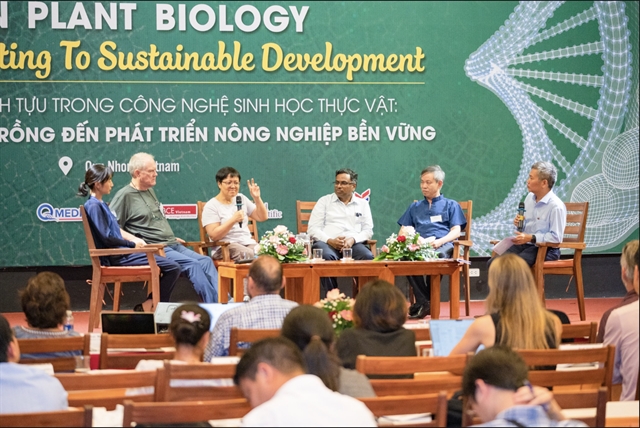 Society
Society


|
| Scientists discussing at the Việt Nam International Conference on Advances in Plant Biology from Gene Editing to Sustainable Development, in Bình Định Province in April 11 and 12. — Photo courtesy of Croplife |
BÌNH ĐỊNH — Việt Nam has now completed the orientations and legal basis for the application of biotechnology crops that are considered an important solution in sustainable agricultural development, said Prof. Phạm Văn Toản, deputy director of the Việt Nam Agricultural Science Institute.
However, up to now, Việt Nam still does not have specific legal guidelines for the evaluation and management of gene-edited crops, the professor said in the two-day Việt Nam International Conference on Advances in Plant Biology from Gene Editing to Sustainable Development, held in Bình Định Province, that ended on April 12.
The conference focused on the latest breakthroughs in the genome editing field and its applications in agriculture, especially in addressing climate change challenges.
According to Toản, since the 1980s, Việt Nam’s agricultural productivity has grown rapidly, contributing significantly to national food security and enhancing the competitiveness of Vietnamese agricultural products in the international market.
However, the country is still facing many challenges related to climate change and the environment, he said.
The World Bank has ranked Việt Nam as one of the five countries most at risk of being affected by global warming in the future.
In recent years, the field of plant biology has witnessed remarkable advancements that deepen people's understanding and offer transformative solutions to global challenges, such as food security and climate change.
Among the game-changing technologies, genome editing stands out as a powerful tool, providing unprecedented precision and efficiency in manipulating plant genomes.
Genome editing techniques has opened up exciting possibilities as researchers worldwide explore ways to engineer crop varieties with enhanced nutritional content and develop climate-resilient plants capable of thriving under changing environmental conditions.
As this technology continues to advance, it holds immense promise of transforming agriculture and ensuring sustainability for future generations.
In Việt Nam, scientists are currently researching and initially succeeding in creating rice variety that is drought-resistant.
The conference gathered esteemed speakers who are at the forefront of their respective fields sharing their expertise and insights, offering valuable perspectives on the latest breakthroughs and the transformative potential of genome editing.
The conference was also a venue to update legal regulations and approaches to managing gene-edited crops in the world today. — VNS




